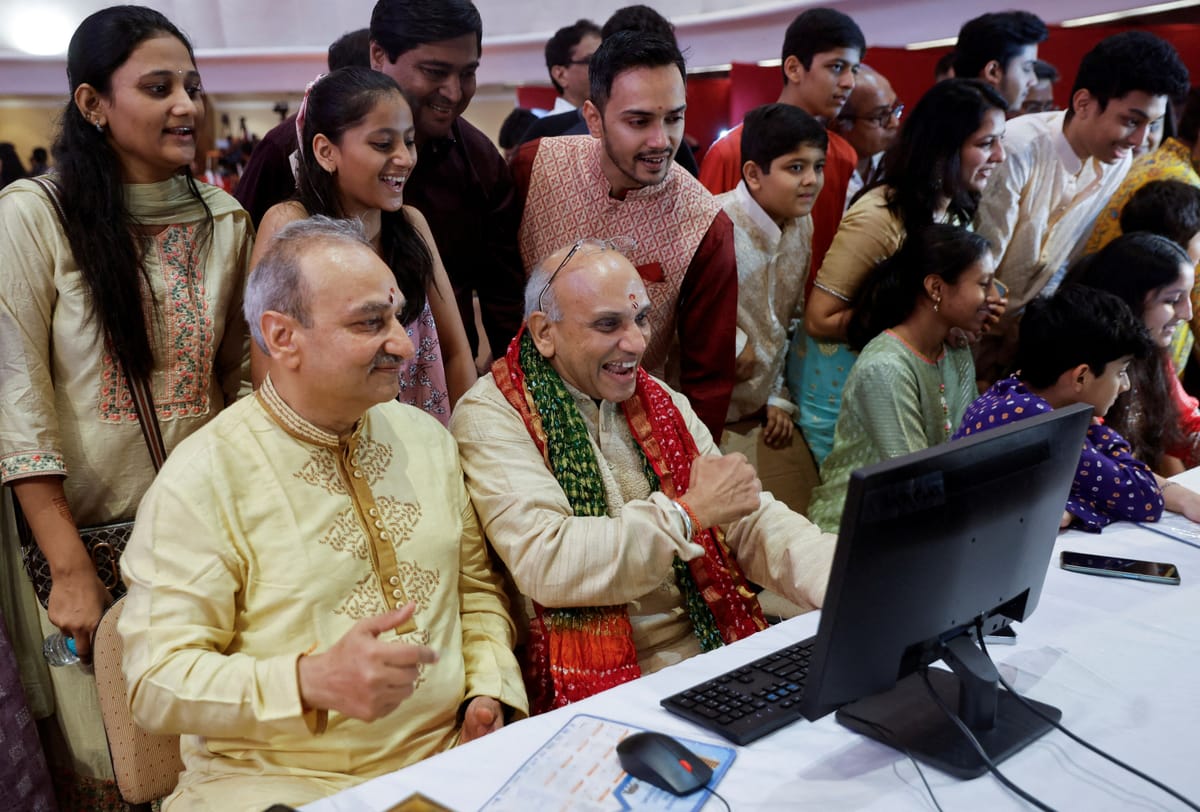India overtakes Hong Kong, becoming the world’s seventh-largest stock market
India’s stock market has snagged the seventh spot worldwide, surpassing Hong Kong in stock market value.

A few minutes every morning is all you need.
Stay up to date on the world's Headlines and Human Stories. It's fun, it's factual, it's fluff-free.
The backstory: India's stock market has a rich history, transitioning from traditional open outcry trading (where investors gather in person at the trading floor to buy and sell stocks – think 80s-era Wall Street) to electronic platforms. Represented by indices like the BSE Sensex and NSE Nifty, it has grown a lot, becoming one of the world's largest markets and attracting both domestic and international investors. This year, India is a standout in the Asia-Pacific market. Thriving markets, driven by increased liquidity and domestic participation, coupled with favorable global macro shifts, have made it a key player.
On the flip side, the Hong Kong stock exchange has encountered hurdles. The Hang Seng Index (HSI) is on track for its fourth consecutive year of decline, indicating a challenging period for this historically influential financial hub.
More recently: In November, Hong Kong trimmed its 2023 growth forecast from an optimistic 4-5% to a cautious 3.2%, citing global tensions and financial constraints. Meanwhile, China had set a 5% growth target for 2023 earlier in the year, with a third-quarter GDP of 4.9% fueling positive expectations.
But the mood shifted last week when Moody's, a respected rating agency, downgraded Hong Kong's outlook from stable to negative, citing financial, political, institutional and economic ties with mainland China as contributing factors.
The development: India’s stock market has now snagged the seventh spot for the largest stock exchanges worldwide, surpassing Hong Kong in market value. By November's end, the National Stock Exchange of India clocked a market cap of US$3.989 trillion, edging past Hong Kong's US$3.984 trillion, according to World Federation of Exchanges data. India's Nifty 50 index is on fire, hitting another record high on Tuesday. With a 16% surge this year, it's gearing up for an eighth consecutive year of gains. In contrast, Hong Kong's Hang Seng index is taking a hit, plummeting by 17% year to date.
Key comments:
“When you look around the world, there aren’t that many countries where for the next 15-20 years you can be reasonably confident that you will see real GDP growth of at least 6 per cent on a sustainable basis,” said Pratik Gupta, chief executive and co-head of institutional equities at Kotak Securities in Mumbai.
"Hong Kong's economy is poised for a soft landing in 2024 as annual real GDP growth moderates to around 2% from 2023′s 3.5%," said economists at DBS. "Central to this recovery is mainland tourism revival, fortifying retail and catering sectors."
"For the general election, opinion polls and recent state elections indicate that the incumbent BJP-led government may secure a decisive win, which could trigger a bull run in the first three to four months of the year on expectations of policy continuity," said HSBC strategists in a client note.
"The change in Hong Kong's rating outlook reflects Moody's assessment of tight political, institutional, economic and financial linkages between Hong Kong and the mainland," said Moody's in a statement.
"Hong Kong's deepening and expanding economic and financial ties with the Mainland should not be a rating constraint," according to the statement released by the Hong Kong government. "On the contrary, these ties are a source of strength for Hong Kong's long-term development."




Comments ()